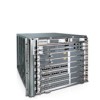Dell Force10 E300 Installing and Maintaining the E300 System - Page 45
Removing and Replacing Components, Removing and Replacing the Fan Tray
 |
View all Dell Force10 E300 manuals
Add to My Manuals
Save this manual to your list of manuals |
Page 45 highlights
10 Removing and Replacing Components This section provides instructions for removing and replacing the following E300 components: • Removing and Replacing the Fan Tray • Removing and Replacing Power Module • Removing and Replacing RPMs, Line Cards, or SFMs • Removing and Replacing the Air Filter When a component fails, the E300 System system triggers major or minor alarm LEDs (located on the RPM), sends events to the SNMP trap and show alarms table, disables or changes component Status LEDs or triggers an audible alarm. Refer to Appendix C, Alarms, on page 57 for more information on alarms. For details on returning components to Dell Force10, see Requesting a Hardware Replacement on page 66. When a component fails, the E300 System system triggers major or minor alarm LEDs (located on the RPM), sends events to the SNMP trap and show alarms table, disables or changes component Status LEDs or triggers an audible alarm. Refer to Appendix C, Alarms, on page 57 for more information on alarms. Removing and Replacing the Fan Tray A fan tray failure or a failure of one fan within the fan tray is recognized by an unlit LED, an SNMP trap, or major alarm event. The failure requires a replacement of the entire fan tray. While you replace the fan tray, the E300 system will operate safely for approximately one (1) minute at an ambient temperature of 95° F (35° C). To remove and replace the fan tray, you must be able to pull the fan tray completely out of the slot (at least 20 inches). Removing and Replacing Components | 45















